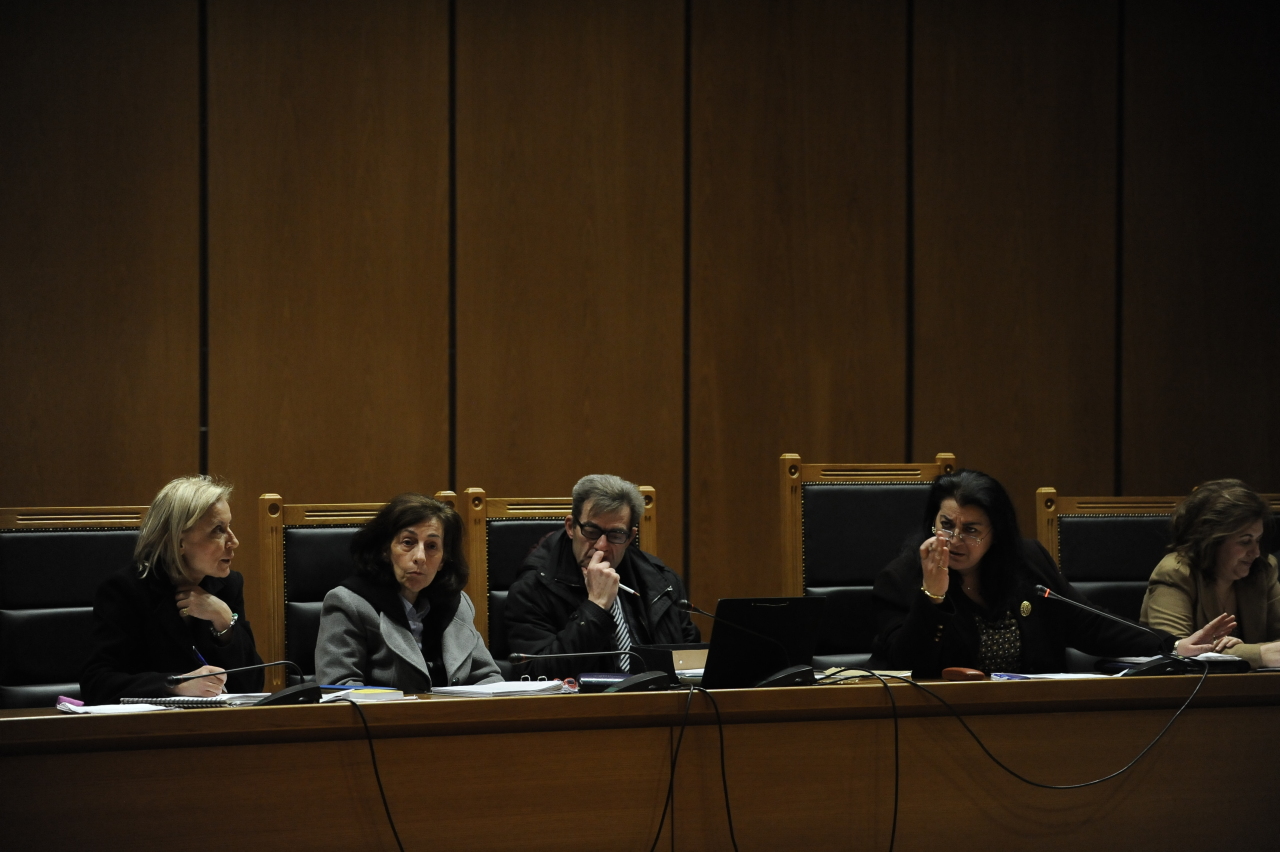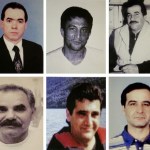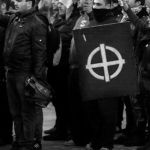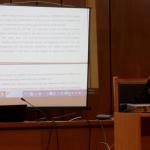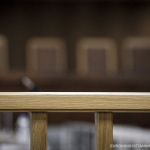139th Hearing, Court of Appeals, March 16th, 2017
I. Access to the Court
The courtroom remains open to the public upon presentation of a state ID card, which is retained by court authorities for the duration of the session. There was significant attendance from members of the press, reduced public attendance, and increased police presence in the courtroom.
II. Presence of defendants
None of the defendants was present at the hearing.
III. Testimony of witness Mazhar Iqbal
A. Examination by the members of the court
Responding to questions by the presiding judge, the witness stated that he has been living in Greece since 2011, and that since then he has been a resident of the village of Vainia in Ierapetra. He works in the greenhouses and lives in a house that was rented by his brother. One night in 2013, at about 20.00-20:30 he was walking with his friend Ali Laqat towards the door of their house. The witness with Ali Laqat were 2-3 meters away from the house without noticing anything strange, because the house is a semi-basement. It was then that they saw 10-12 people hitting his brother with wooden beams. They heard shouts and some of the people attacked them. He was hit in the head and he can’t say if he was hit by a wooden or a steel club. Apart from the witness and his brother, Ali Laqat was also beaten up. All three were taken to the hospital. He had stitches in his head and the other two had only superficial scratches and bruises. In the end they were hospitalized for one night and the next they were discharged. The witness did not recognize the people that attacked them. The police tracked them down from the broken window of the car they used to come to the village.
Some time before the attack, another incident had taken place, with Molotov bombs. While he was in his house, someone had thrown bottles at the door. One of them shattered and he heard his roommates go out to see what had happened. They saw some motorbikes getting away and they put out a small fire. They didn’t report the incident to the police because they didn’t have resident permits and were afraid they would get into trouble. The witness and his countrymen (Pakistanis) talked it over and they reached the decision that they must be careful, that in Athens Golden Dawners see a Pakistani on the street and beat him up.
B. Examination of the witness by the civil action counsels
The witness was questioned by the civil action counsels Kabagiannis, Zotos, Malagaris, and Tzellis.
The witness said that he had no personal or financial differences with his employers or other people in the village. He lives in a house rented from Mr. Bilalis whom he described as a very kind landlord. Given that he had heard that in Athens Golden Dawn was beating Pakistanis, he and his countrymen believe that the people that attacked them could only have been Golden Dawners, something that was later confirmed by the police.
The witness stated that his house is 5-6 minutes outside the village, and the people that attacked him and his friends were not living in the village. Responding to a question by the civil action counsel Stratis about the motives of the attack, the witness said “you should ask them why they came and beat us up”.
C. Examination by the civil action counsels
The witness was questioned in turn by the defense counsels Bounas, Spyropoulos, Oplantzakis, Tsagas, Papadelli, G. Michalolias, and Alexiadis.
The witness stated that about 80-100 Pakistanis live in the village. Their life each day consists of going to work and coming back home, and they have no differences with each other. He pointed out that he is afraid that he will be attacked again. However, after the last incident no one has attacked the witness or any of his countrymen.
The witness stressed that he had never seen any of the assailants before or after the incident, and that he remembers no facial characteristics, only that they were wearing black clothes. In any case he was dizzy from the hit on the head and can’t remember much from the incident itself. When asked, he explained that there are two roads that lead to the house, either through the oil mill, or from the other side.
Defense counsel Oplantzakis pointed out that the witness made a preliminary testimony on February 13th, 2013, without the aid of an interpreter, but later defense counsel G. Michalolias found that to be incorrect.
IV. Testimony of witness Petros Kapouas
A. Examination by the members of the court
The witness is a manager in a co-op oil mill in the aforementioned village. However, he lives in another village, in Pachia Ammos. He said that many Pakistanis are living in the area, and that 95% of the immigrants there are Pakistanis. They are settled agricultural workers in the greenhouses. The oil mill doesn’t employ immigrants, only Greeks.
On the day of the attack he was working in the oil mill when two muscular men came in. They were dressed in black clothes (the clothes did not bear the Golden Dawn logos and the men had shaved heads – and in any case they weren’t the typical Cretans who wear black). The taller of the two asked him whether they employ Pakistanis in the oil mill and the witness said no. They stayed for about 1 minute and then they left. The witness went on with his work and after a while (about 10’) he was informed that an ambulance had arrived for the Pakistanis, who were wounded. The house where the Pakistanis were staying is not visible from the oil mill. After a while the police came to the oil mill -witness Bilalis had called them from the oil mill-, who among other things collected data from the security cameras outside the building of the oil mill. The witness testified that those persons weren’t from around and he had never seen them before. He had heard that one of the teachers of the school, Petrakis, who was also his own teacher when the witness was a student, was the brains of the operation and the leader of the local chapter of Golden Dawn.
The witness said that some damage was caused to the Pakistanis’ house, but it was easy to repair. He was adamant that no one came to ask for olive oil from the oil mill.
B. Examination of the witness by the civil action counsels
The witness was questioned in turn by the civil action counsels Kabagiannis, Zotos, Papadakis, Malagaris, Antanasiotis, Papadopoulou, Tobatzoglou, and Tzellis.
The witness testified that the assailants’ group must have been comprised of about 10 people, but only two of them came to the oil mill. He connected the presence of these two men with the attack on the Pakistanis, although he has no more evidence to offer to the court on this matter. He noted that the two persons that came to ask if any Pakistanis were employed there were looking around to see if any Pakistanis were there. The witness did not think that anything was amiss.
Responding to questions by civil action counsel Zotos, the witness stressed that if someone wanted to attack the Pakistanis that were staying at this particular house must have had some sort of information, since the house is hard to find – it is a semi-basement. Responding to questions by civil action counsel Papadakis, the witness said that the locals attributed the attack to Golden Dawn, because they are peaceful people that don’t get into fights, whereas the Golden Dawners are the ones that usually don’t get along with immigrants. When asked about the motive of the attack, he said that “if you have no problem with someone you don’t go and beat him up. Unless you have been brainwashed”.
Concerning the activity of Golden Dawn the witness testified that “wherever they go they beat people up, the beat up the immigrants. Terror. Isn’t that what it is, when you beat someone up and he’s afraid?”.
C. Examination of the witness by the defense counsels
The witness was questioned in turn by the defense counsels Spyropoulos, Bounas, Oplantzakis, Tsagas, Papadelli, Tsebetzi, G. Michalolias, and Roussopoulos.
The witness stressed that Petrakis was not among the 10 men that he saw. On the other hand, Psyllakis and Daskalakis were definitely not the two persons that had come to the oil mill. The witness calculated the percentage of immigrants in the area at about 10%. He noted that he hasn’t heard of any other similar incidents, saying that “years back we had only Albanians, and when the Bulgarians came they were fighting each other, kicks and punches. I’ve never heard of fights between Pakistanis”. When asked by defense counsel Tsagas whether Golden Dawn spokespersons are called to TV news, the witness said that “No, I don’t see Golden Dawn on the news. Only once I remember Kasidiaris slapping Kanelli on that Papadakis show”.
Testimony of witness Andreas Bilalis
A. Examination by the members of the court
The witness stated that he has been a resident of the village for the past 15 years. He is a mechanic and for the past 17 years he has specialized in olive mills, and he’s responsible for the two co-op oil mills of Vainia and Kentri. About 200 meters outside the village he owns about 2000 sq. meters of land, on which lies a house with two semi-basement apartments which he has been renting to Pakistanis for the past 10 years. As he said, Vainia has a population of about 130 residents and the Pakistanis are about that many.
On February 13th, 2013, the witness saw about 10 persons gathered there and he got very nervous. Twice before, without any provocation, they had thrown Molotov bombs to the Pakistanis that are renting his house. He had taken a look at the marks left on the house after the first attack (on the wall of the building, pieces of glass, the cloth, and burn marks outside the aluminum door). As he said, the fire had been put out by the Pakistanis. He stressed that they had no differences with no one. And that from then on “they were afraid of Golden Dawn. They said the word not with their customary broken pronunciation, but with exceptional clarity”, something that gave him the impression that they knew it well, that they talked about it a lot. Golden Dawn had no presence in the village, however they had opened a local chapter in 2012-2013 in Ierapetra – which is nearby, just 3 km away. The members “held marches with military commands in the middle of Ierapetra, made speeches, and stamped their feet”.
The witness explained that the people in the area are very peaceful and that on the two occasions that Molotovs were thrown to the house, the police wasn’t called, because the Pakistanis had no papers and were afraid to file charges.
On February 13th, 2013, the witness left the oil mill at about 20:00 for Ierapetra and saw about 10-12 people, around two parked jeeps. Two of them went inside the oil mill, one of them had locked one of the jeeps and was waiting for them and the rest were walking towards the eastern side of the oil mill building. The witness stated that he saw them take the asphalt road and not the fields (and so was sure they were going to the Pakistanis). He noted their license plate numbers. He went around with his car and saw the aforementioned men take lengths of wooden beams from a construction site. He got afraid because he was almost certain they were going to the Pakistanis. He tried to call them to warn them and got one of their roommates. He told him to get away now but as he said, many times they say “yes” and they haven’t understood what you’ve told them. He went to Ierapetra to take care of something and got back about 20 minutes later. Then he saw that the police, which he wasn’t the one to call, had already arrived.
The presiding judge adjourned for March 20th, 2017, at the Women’s Wing of Korydallos Prison, where the testimony of witness Andreas Bilalis is expected to conclude (he will be examined by the members of the court, by the civil action counsels, and the defense counsels), and then the court will proceed with the comments under article 358 CCP concerning the witness testimonies in the case of the assault on “Synergeio” up to the current one.

